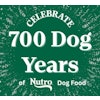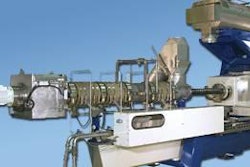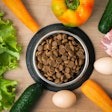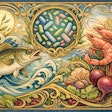Today's premium petfood aisle is filled with lifestage foods. While some assert that kitten, puppy and senior foods are more about marketing than nutrition, these formulas represent the efforts of premium manufacturers to develop foods that best meet the needs of pets throughout their lives.
Many dog and cat foods on the shelves are labeled 100% complete and balanced for all life stages. By altering the amount fed per pound of body weight, pet owners can deliver the right amount of nutrition for each life stage, but with lifestage-specific petfoods, additional calories for growth, minerals and protein targeting critical areas such as joints and sight, are already a part of the formula.
Dogs and cats have different needs
A pet's dietary needs change over the course of his life, from birth to adolescence to adulthood to old age. A lifestage diet (see diagram ) is one that is tailored to meet the different nutritional needs as your pet ages. Dogs' and cats' nutritional requirements are quite different from one another.
Kittens and puppies
Puppies need nearly four times the energy than adult dogs, and they need extra protein to help build new tissue. So an energy-rich diet including protein, fat, calcium and phosphorous is important during this phase.
Puppies' needs also vary according to breed. Toy and small breed dogs need higher levels of these nutrients, while large breed dogs need less to control their growth rate, and medium-sized dog breeds are between the two. Too little or two much of these nutrients can cause problems with canine skeletal structure and possibly lead to obesity.
Kittens, due to the small size of their mouths and digestive systems, can't eat much at one sitting. Their food should be high in easily digestible animal protein and other important nutrients, such as fiber, essential vitamins and minerals, and taurine, an amino acid found in chicken and fish sources. They are developing their immune system and adequate protein is essential for the development and ongoing maintenance of a nimble defense system. Kitten foods are also slightly higher in certain minerals like calcium and phosphorus for bone growth and development.
According to veterinarian Dr. Cori Gross , who is a VPI Pet Insurance field veterinarian, there is evidence suggesting that adding DHA-an essential fatty acid that improves brain development and is mandatory in human baby formula-to puppy or kitten food can actually make animal's smarter. The special fatty acid is thought to help with the development of vision and the brain.
Adolescent and adult dog years
The recommended time to switch a dog's diet to an adult food formula is ideal when the dog is close to his adult height, approximately at two years of age. An adult diet that is tailored for this dog life stage will depend on the breed and their level of activity. Many veterinarians recommend that a dry food diet is best to help keep his teeth healthy-and for larger breeds, to provide more caloric density.
While some dogs may require special diets due to medical issues, the average small or medium breed dog should eat food containing, according to Gross:
- High-quality, animal-based protein for muscle maintenance;
- Fiber for a healthy digestive tract;
- Essential vitamins and minerals for the immune system;
- Vitamin-rich fish oils for a healthy coat and skin, and for overall health;
- Healthy grains for energy; and
- Large breed dogs may need food containing glucosamine and less fat than a medium breed dog to help maintain joint health.
Adolescent and adult cat years
Veterinarians recommend transitioning kittens to adult food at about nine months of age. Cats tend to put on weight after they are spayed or neutered, which occurs at six months or earlier.
Holistic petfood blogs often suggest blending dry cat food with canned food for a well-rounded meal. Cats are strict meat eaters, or carnivores, so the food should contain a high level of easily digestible protein. Fat is also important for needed calories.
Adult cat food should also contain:
- Vitamin A, from liver, kidney and other organ meats, and niacin for healthy growth;
- Essential fatty acids for healthy skin and fur; and
- Taurine for healthy eyes and heart muscle.
Senior pets
Dogs and cats are living longer than they did several decades ago. They are better vaccinated and receive routine veterinary care. Therefore, they also are getting better nutrition.
A senior pet is one considered to be in the last third of life. For instance, if a particular breed of dog has a life expectancy of 12 years, then it will be "senior" by age eight. If a cat has an expectancy of 18 years, then it would be considered "senior" around age 12.
Of course, some animals remain healthy and active well into their old age. Others, however, undergo physiological changes that can be impacted through diet.
Obesity can become an issue. Kidney failure is not uncommon. Senior dogs need a diet lower in calories, protein and fat, and one higher in fiber, as most are not as active as they were.
Senior cats do not need a reduced-calorie diet as they maintain their energy needs throughout adulthood-obesity risks greatly decrease after age 10. Senior cats still need a high amount of protein. They don't necessarily absorb fat as well, so they might need more digestible fat in their diets for the same amount of energy.
Both senior cats and dogs can develop dental issues and can begin to lose teeth, making it more difficult for them to eat hard kibble. For senior cats or cats with certain medical problems such as bladder problems or obesity, Gross recommends that most if not all calories come from canned food.
















